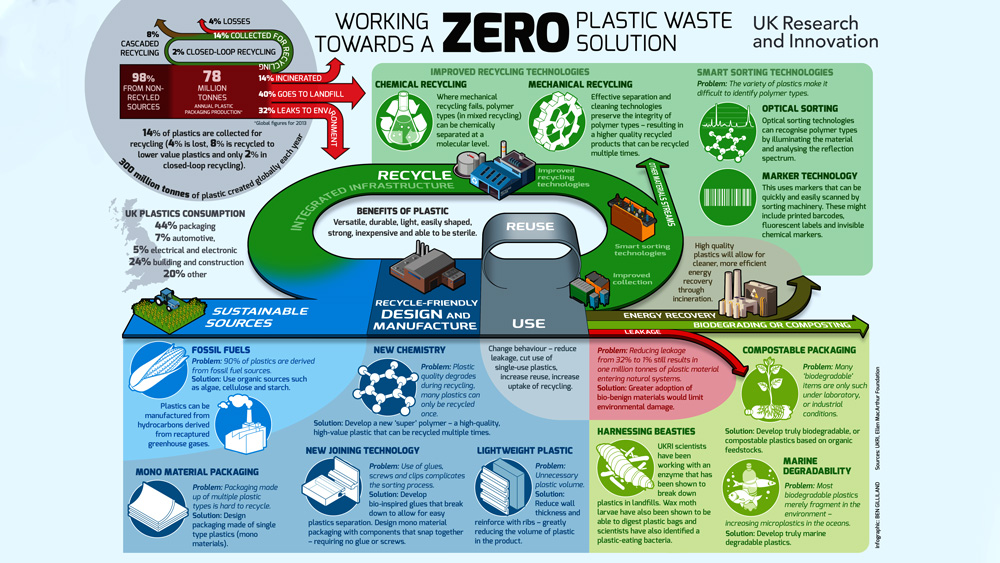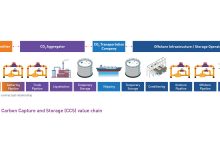Reducing Environmental Impact of Plastics: UKRI to Invest £800,000 in Projects
Better design of products, processes and services is one way of reducing the environmental impact of plastics. However, the design must be one that consumers and users will want to adopt and it needs to fit with the way they behave.
Innovate UK, part of UK Research and Innovation (UKRI), has up to £800,000 from the Plastics Research and Innovation Fund, to invest in business projects that seek to better understand the behaviour of customers and users and use that understanding to create innovative design concepts.
Businesses can apply for a share of £800,000 to look at innovative designs for products, services or business models that make plastic use more sustainable.
The world produces around 350 million tonnes of plastic every year. Europe recycles about 40% of its plastic waste. Some of the rest goes to landfill or for incineration and some still leaks out into the environment.
Tackling the plastics problem
UK Research and Innovation (UKRI) is in the unique position of sponsoring a broad range of research and innovation that can contribute to solving the plastic waste problem.
Plastics Research and Innovation Fund
The £20 million Plastics Research and Innovation Fund (PRIF) aims to explore new ideas and innovations that can bring changes in the UK’s plastics manufacturing and consumption patterns.
PRIF engages Britain’s best scientists and innovators to help move the country towards more circular economic and sustainable approaches to plastics.
It is managed by UKRI and delivered via the Engineering and Physical Sciences Research Council (EPSRC), Innovate UK, and the Natural Environment Research Council (NERC).
The fund to reduce the environmental impact of plastics has three parts which involve:
- Leadership and Knowledge Exchange ~ £2 million;
- Research: Plastics ‘Creativity’ funding ~ £8 million;
- Business led research and development: Plastics ‘Innovation’ funding ~ £10 million.
The fund seeks to deliver strategic networking and research that will coordinate existing knowledge across the UK; catalysing new ideas and rapid solutions across the research and innovation landscape. It will support the polymer, packaging, retail and waste sectors as well as local government responsible for waste collection.
Plastics innovation: towards zero waste
UKRI and Policy Connect are collaborating on Zero Plastic Waste, an event series to examine how to achieve the vision of Zero Plastic Waste and make the UK a global leader on the issue.
Creative circular economy approaches to eliminate plastics waste
Eight research projects that will explore new and different ways of making, using and recycling plastics were announced in December 2018.
The researchers will investigate alternatives to fossil-based materials for plastics, as well as looking into the complex factors involved in the life cycle of plastic materials, from consumers’ and business’ needs and behaviours, to how to use technology to reclaim or break down plastics.
Through the recently published Bioeconomy Strategy, part of the government’s modern Industrial Strategy, producing less carbon intensive products, including plastics, was identified as a key challenge area alongside reducing plastic waste. This will lead to a circular economy where greater emphasis is placed on ‘use, reuse and recycle’.
Projects must base ideas on customer research
Projects must develop design concepts that do not rely on single-use plastic using customer and user research. They could look at redesign of existing goods, services or business models or design of entirely new ones. The design concept should prioritise reuse of products and extending the life of products over recycling.
If a project is looking at ‘design for recycling’ then it must be compatible with existing recycling technology and infrastructure.
Design could include contributions from engineering, materials science, service design, circular design and systems thinking.
Competition information
- The competition is open, and the deadline for applications is at midday on 16 September 2020.
- Businesses of any size may apply.
- UKRI expects projects to range in size between £20,000 and £80,000 and last between 3 and 6 months.







